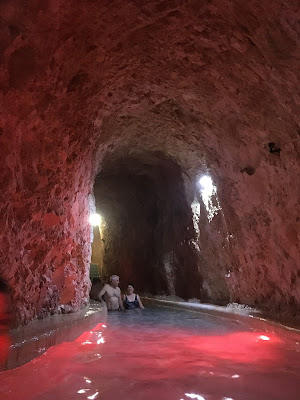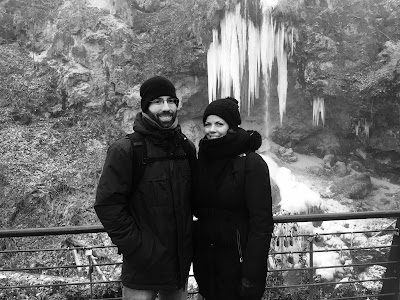Unless you hate music, the EU, or American elections that make sense,
you probably continually felt the need to wash the dirt of 2016 off. Except
it didn't come off.
Thank goodness for the Hungarian baths. The places people crowd on the
morning of New Years Eve to wash off a year of indecencies with thermal mineral
water before committing more indecencies that night.
But I'm not dwelling on 2016 here. I'm letting social media deal with
that and moving on. And how couldn't you move in a place like this?
We didn't have to go too far for our bath: the cave bath
in Miskolctalpolca is only a two-hour train ride from Budapest.
The New Years Eve morning wash-off at the baths before the party is a
tradition in Hungary. I experienced it with a few friends on my first New Years
Eve at Szechenyi. We had to arrive early to beat the crowds.
At Miskolc, Hungarians in the line-up outside were ordering their year
tickets. Inside, the bath was already crowded with locals and tourists
at 9:30am.
The bath could handle the overflow – it was big, cavernous even. The
caves twist and turn, and bathers waded along, many with cell phones and selfie
sticks to document their bath. There was a normal cave bath, then a warmer
pool, and a few warmer thermal pools that were not so cave-like – our
favourites.
We lasted about three hours in the pools before our fingers and toes
went pruney and, let’s be honest, we got bored wading, floating, and soaking.
This is likely why all those tourist information photos of the baths show old
men playing chess in the water.
 |
| The castle of Diosgyor. |
On New Years Day, we wound our way through the foggy streets of Misckolc on a tram. It was almost completely deserted. Everything closed. Everyone staying warm at home. Not us. We were sightseeing.
We made our way out into the suburbs of Miskolc to reach our first stop:
Diósgyör castle.
This seemed like a strange place for a castle. It’s not on a high hill,
so it’s hard to see. We had to walk through a residential neighbourhood until
we finally caught a glimpse of it.
Like everything else on New Years Day, it’s closed. So, we walked around its base
where the moat used to be. We snapped photos in the mist until our toes get
cold enough that we decided to leave.
Back on the tram to the end of the line. Then onto a bus, heading further,
deeper into the hills around the city. We were off the Lillafüred.
As the bus rose into the hills, the fog thickened and the temperature
dropped. The town, like Miskolctapolca, where our cave bath is located, is a
resort town, but just a little more upscale. A grand old hotel sits on a hill
overlooking a waterfall and terraced garden to one side and a man-made lake on
the other side. There was forest all around us.
We were cold and tired, so went into the hotel for a hot coffee (Irish
coffee for me) among the hotel bar fanciness.
We ate a hearty Hungarian meal at a less grander, more affordable
establishment next door and washed it down with strong Transylvanian craft beer
(Csiki, I recommend it!). Then we ventured onto the lake for a walk on water.
People like to travel to see new things and experience new things. Some of us,
even me, convince ourselves that you have to go far off to the edges of the map
to see something fresh and new.
This trip, though it was meant as a side trip during the Christmas break
in Hungary, proves that you don’t have to go far off the beaten path to see
something new and incredible. There are great things nearby, no matter where
you happen to be. Maybe just a two hour train ride away, you just have to train
your eyes a little closer to your own surroundings.
If you go:
We managed to get a room at Amaretto Szallas at the last minute after checking in and immediately out of the disaster zone that was our first hotel. It's run by a nice couple and is close to the baths and public transit.
We had a great, simple lunch at Corso Pizzeria. Highly recommended.
We had a great, simple lunch at Corso Pizzeria. Highly recommended.
The Cave Baths at Miskolctapolca are a great place to soak up some minerals. Every local we met said we should visit in the spring and summer too. When we saw all the outdoor pools closed for the winter, we realized a trip in the summer would be well worth it.
Just go to Lillafüred. It's pretty.







